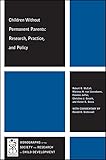Children without permanent parents : research, practice, and policy / edited by Robert B. McCall ... [et. al. ; with commentary by Harold D. Grotevant. [print]
Material type: TextSeries: Monographs of the Society for Research in Child Development ; v. 76, no. 4.Publication details: Boston, Massachusetts : Blackwell Pub., (c)2011.Description: viii, 318 pages : illustrations ; 23 cmContent type:
TextSeries: Monographs of the Society for Research in Child Development ; v. 76, no. 4.Publication details: Boston, Massachusetts : Blackwell Pub., (c)2011.Description: viii, 318 pages : illustrations ; 23 cmContent type: - text
- unmediated
- volume
- 9781118307007
- HV862.G881.C455 2011
- HV862
- COPYRIGHT NOT covered - Click this link to request copyright permission:
| Item type | Current library | Collection | Call number | Status | Date due | Barcode | |
|---|---|---|---|---|---|---|---|
 Circulating Book (checkout times vary with patron status)
Circulating Book (checkout times vary with patron status)
|
G. Allen Fleece Library CIRCULATING COLLECTION | Non-fiction | HV862.C485 2011 (Browse shelf(Opens below)) | Available | 31923001817457 |
Children in institutional care: delayed development and resilience Marinus H. van IJzendoorn ... [and others] -- Development of adopted children with histories of early adversity Femmie Juffer ... [and others] -- Attachment and emotional development in institutional care: characteristics and catch up Marian J. Bakermans-Kranenburg... [and others] -- Growth failure in institutionalized children Dana E. Johnson and Megan R. Gunnar -- The neurobiological toll of early human deprivation Charles A. Nelson III ... [and others] -- Sensitive periods Charles H. Zeanah ... [and others] -- Ideal components and current characteristics of alternative care options for children outside of parental care in low-resource countries Victor K. Groza, Kelley McCreery Bunkers, and Gary N. Gamer -- The situation for children without parental care and strategies for policy change Patrice L. Engle ... [and others] -- Research, practice, and policy perspectives on issues of children without permanent parental care Robert B. McCall -- Commentary: Emerging issues in bridging developmental science, practice, and policy in the best interests of children without permanent parents Harold D. Grotevant.
"This monograph reviews the research, practice, and policy literatures pertaining to children without permanent parents, most of whom spend their early months or years in institutions. Institutionalized children are typically more than a standard deviation below noninstitutionalized children in general physical and behavioral/cognitive development. Although they display marked catch-up growth after transitioning to adoptive or foster families, some deficiencies persist."--Abstract
COPYRIGHT NOT covered - Click this link to request copyright permission:
There are no comments on this title.
